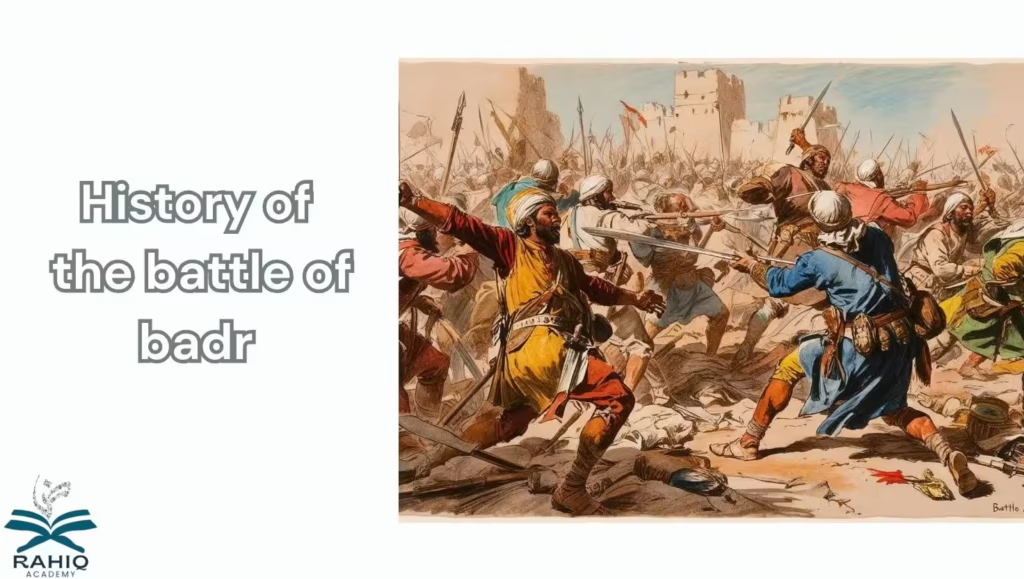History of the battle of badr: Just 313 men defeat an army three times larger? According to Encyclopedia Britannica, this clash in 624 CE changed history. But how? Tensions had been rising: persecution in Mecca, a risky migration to Medina, and raids on caravans. Then, divine command turned a small skirmish into Islam’s first victory. Here’s why it mattered—and the 7 key events behind the battle that reshaped Arabia.
When was the Battle of Badr?
The Battle of Badr happened on the 17th of Ramadan, in the second year after Hijrah, around March 624 CE. Though the Muslims were fewer in number, they stayed united and achieved victory. It was the first major win in Islamic history. When was the Battle of Badr? Many still ask this today. The Battle of Badr Islam showed that strong faith, patience, and trust in Allah can lead to success, even against all odds.
Battle of Badr: 8 Key Facts You Need to Know
| Feature | Details |
| Date | 17 Ramadan, 2 AH / 13 March 624 CE |
| Location | Badr, Hejaz region, Arabia (approx. 80 miles SW of Medina) |
| Cause | Underlying: Response to Quraysh persecution & injustice. Instant: Attempt to intercept Quraysh caravan; Quraysh military response. |
| Result | Decisive Muslim victory |
| Belligerents | Muslims (Medina) vs. Quraysh (Mecca) |
| Commanders | Muslims: Prophet Muhammad. Quraysh: Amr ibn Hisham (Abu Jahl) |
| Strength (Approx.) | Muslims: 313 men, 2 horses, 70 camels. Quraysh: 950-1,000 men, 100 horses, 170+ camels |
| Casualties (Approx.) | Muslims: 14 martyrs (6 Muhajirun, 8 Ansar). Quraysh: 70 killed, 70 captured |
Background of Tensions: 7 Key Events Leading to the Battle of Badr Islam
History of the battle of badr (624 CE- 17 Ramadan 2 AH) wasn’t just a fight—it reshaped Islam’s destiny. It marked the first major military clash between the Muslim community and the Quraysh of Mecca, setting the stage for Islam’s rise as a global force. Below, we explore the 7 key facts that led to this monumental event.
Background: Building Tensions Before Badr
The tension between the Muslims and the Quraysh didn’t appear overnight. It built up over time, rooted in religious differences, economic struggles, and a desire for revenge. Here’s how the background of tensions unfolded:
1. Persecution in Mecca
- Early Muslims, led by the Prophet Muhammad, faced intense opposition from the Quraysh.
- Prophet Muhammad’s message threatened Mecca’s economy. Why? Pilgrims paid to visit idols—Islam’s monotheism risked their cash flow
- They were subjected to torture, social isolation, and economic boycotts. all to crush their faith.
2. Migration to Medina
- Forced to flee from Mecca in 622 CE (the Hijra) But the Quraysh stole their homes and wealth, leaving families destitute.
- The Muslims found refuge in Medina, where they could practice their faith freely.
- Medinan Muslims (Ansar) welcomed the exiles. This unity scared the Quraysh, who saw Medina as a rising rival.
- However, the Quraysh saw this as a direct challenge to their control, especially over the trade routes.
3. Economic Pressure
- The Muslims had lost property and wealth when forced to leave Mecca, leading to frustration and a desire for justice
- The Quraysh imposed economic sanctions on Medina to isolate the growing Muslim community, hoping to weaken them by blocking trade routes.
- The Quraysh banned trade with Medina. No food, no goods, a move meant to starve the Muslims into submission.
4. The Quraysh Caravan
- The Muslims saw an opportunity to reclaim what was theirs by intercepting a Quraysh caravan, which escalated tensions further.
5. Divine Command
- Muslims believed that Allah had commanded them to fight in self-defense, deepening their resolve and shifting their stance from passive to active retaliation.
6. Escalation to War
- When the Quraysh sent an army to protect the caravan, what started as a trade dispute quickly became a battle for survival.
7. Unity of Muslims
- Muslims believed that Allah had commanded them to fight in defense of their faith, deepening their resolve.
The Nakhla Raid: A Key Turning Point
- Before the battle, the Nakhla Raid in January 624 CE was a critical escalation. Although controversial, it marked the first Muslim military success.
- Tensions were further heightened by the Quraysh, who perceived it as a breach of the sacred month of Rajab.
- This raid prepared the ground for Badr by demonstrating that the Muslim community was capable and determined to take on the Quraysh head-on.
The Final Catalyst: Abu Sufyan’s Caravan
- In March 624 CE, Abu Sufyan, a key Quraysh leader, led a valuable caravan back to Mecca.
- The Muslims saw this as an opportunity to reclaim their stolen wealth. Upon learning of the Muslims’ plans, Abu Sufyan took evasive action and sent for reinforcements.
- The Quraysh responded with force, and the stage was set for a decisive confrontation.
- Despite the caravan’s escape, the Quraysh army, led by Abu Jahl, continued its march to Badr, seeking to crush the Muslim threat once and for all.
The Battle of Badr: A Pivotal Moment
A. Location and Forces
- On 13 March 624 CE, the two armies faced each other at Badr near the wells of, 80 miles southwest of Medina.
- Muslim Force: Around 313 men, including both Muhajirun (migrants from Mecca) and Ansar (helpers from Medina).
- Quraysh Force: About 1,000 men, well-equipped and determined to crush the Muslim community.
- Despite being vastly outnumbered, the Muslims’ faith and unity led them to a stunning victory, with 70 Quraysh killed and many more captured.
- Control over water sources at Badr became a critical tactical factor in the engagement.
B. Key Events: Strategic Leadership and Courage
- Prophet Muhammad spent the night before the battle praying for divine help.
- The battle began with duels between prominent Muslim warriors and Quraysh champions.
- Hamza ibn Abd al-Muttalib, Ali ibn Abi Talib, and others displayed great courage and boosted Muslim morale.
- The main battle followed, with the Muslims eventually breaking the Quraysh lines despite being outnumbered.
حَدَّثَنِي إِسْحَاقُ بْنُ إِبْرَاهِيمَ، أَخْبَرَنَا جَرِيرٌ، عَنْ يَحْيَى بْنِ سَعِيدٍ، عَنْ مُعَاذِ بْنِ رِفَاعَةَ بْنِ رَافِعٍ الزُّرَقِيِّ، عَنْ أَبِيهِ ـ وَكَانَ أَبُوهُ مِنْ أَهْلِ بَدْرٍ ـ قَالَ جَاءَ جِبْرِيلُ إِلَى النَّبِيِّ صلى الله عليه وسلم فَقَالَ “ مَا تَعُدُّونَ أَهْلَ بَدْرٍ فِيكُمْ قَالَ مِنْ أَفْضَلِ الْمُسْلِمِينَ ـ أَوْ كَلِمَةً نَحْوَهَا ـ قَالَ وَكَذَلِكَ مَنْ شَهِدَ بَدْرًا مِنَ الْمَلاَئِكَةِ ”.
Narrated Rifaa: (who was one of the Badr warriors) Gabriel came to the Prophet (ﷺ) and said, “How do you look upon the warriors of Badr among yourselves?” The Prophet (ﷺ) said, “As the best of the Muslims,” or said a similar statement. On that, Gabriel said, “And so are the Angels who participated in the Badr (battle)
C. The Decisive Outcome: Divine Intervention
- Muslims won decisively, with 14 casualties, including martyrs from both the Muhajirun (immigrants) and Ansar (helpers).
- The Quraysh lost 70 men, with 70 taken captive, including key leaders like Abu Jahl.
- The victory was seen as divine support for the Muslims, with the Quran describing the arrival of angels to assist them.
Why the Battle of Badr Islam Was More Than a Fight?
There was more to history of the battle of badr than just a military conflict. It was the culmination of years of religious and economic struggles, as well as political resistance. The Quraysh feared that Islam would destabilize their control over Mecca and its profitable trade routes.
1. Islam’s Message
- Prophet Muhammad’s teachings threatened the Quraysh’s political and economic power, particularly as pilgrims visited the Kaaba, where many idols were housed. Islam’s monotheism directly challenged their status quo.
2. Economic Struggles
- The Muslims had lost their homes, wealth, and businesses when forced out of Mecca.
- Their pursuit to intercept the Quraysh caravan was not just about reclaiming what was theirs, it was about seeking justice for the oppression they had suffered.
3. Divine Justification
- The Muslims saw their mission as divinely sanctioned.
- The Quraysh’s continued hostility validated their belief in the necessity of fighting back. Allah’s support provided the moral foundation for their defense.
The Legacy of Badr: Islam’s First Victory
- history of the battle of badr became a symbol of faith, unity, and divine support.
- It showed the Muslims’ resolve to stand up for their rights and defend their beliefs, even in the face of overwhelming odds.
- The victory at Badr marked the beginning of Islam’s expansion and established the Muslims as a serious military and political force
- It also signaled the start of six years of conflict between Medina and Mecca, culminating in Islam’s eventual dominance in the region.
- One of the notable outcomes of Badr was the ethical treatment of prisoners. Despite the conflict, the Muslims treated their captives with respect and dignity, emphasizing Islam’s commitment to humane treatment, even in times of war. Many of the prisoners were later ransomed or freed, illustrating the importance of compassion in Islam.
The Path to Islam’s Rise
The Battle of Badr Islam was more than just a fight; it was a turning point in the history of Islam. It showcased the Muslims’ faith, resilience, and unity, setting the foundation for the future of the Islamic Caliphate. The victory also marked a shift from persecution to power and influence, transforming the Muslim community into a force that would change the course of history
Timeline of Key Events Leading to the Battle of Badr
| Date | Event | Significance |
| c. 610 CE | Muhammad begins receiving revelations in Mecca. | Start of Islam. |
| c. 613 CE | Muhammad begins public preaching; Quraysh opposition emerges.7 | Religious and socio-political conflict begins. |
| c. 615 CE | Some Muslims migrate to Abyssinia (Ethiopia) due to persecution. | First emigration seeking refuge from Quraysh’s hostility. |
| c. 616-619 CE | Quraysh imposed a severe social/economic boycott on Banu Hashim/Muslims. | Intensified persecution aimed to force the abandonment of Islam. |
| c. 619 CE | “Year of Sorrow”: Deaths of Khadijah (Muhammad’s wife) and Abu Talib (his uncle/protector); loss of clan protection. | Increased vulnerability for Muhammad and his followers. |
| 622 CE | The Hijra: Muhammad and his followers migrate from Mecca to Medina (Yathrib). Establishment of the Muslim community/state. | Pivotal Event: Islam gains a secure base; start of Islamic calendar (AH); conflict dynamic changes. |
| Late 623 CE | Divine permission to fight against aggressors revealed. First Muslim caravan raids begin (mostly unsuccessful). | Shift from passive defense to active retaliation/economic pressure. |
| Jan 624 CE (Rajab 2 AH) | Nakhla Raid led by Abdullah ibn Jahsh. | Major Escalation: First successful raid yields booty/captives; killing in sacred month angers Quraysh. |
| Mar 624 CE (Ramadan 2 AH) | Events leading directly to Badr | Final steps towards the first major battle. |
| – Muhammad learns of Abu Sufyan’s large caravan. | Immediate target identified. | |
| – Muslim force (approx. 313) mobilizes to intercept. | Muslim offensive action initiated. | |
| – Abu Sufyan evades Muslims, calls for help. | Caravan saved, but call for reinforcement triggers larger Quraysh response. | |
| – Quraysh mobilize a large army (approx. 1000) under Abu Jahl | Massive military mobilization by Mecca. | |
| – The Quraysh army proceeds towards Badr despite the caravan’s safety. | Intent shifts from rescue to confrontation. | |
| 13 Mar 624 CE (17 Ramadan 2 AH) | The Battle of Badr occurs. | First major military clash between Muslims and Quraysh. |
The Importance of history of the battle of badr: 3 Reasons Why It Changed Everything
1. Faith Over Numbers
- The Muslims, numbering around 313, faced a Quraysh army of about 1,000.proving that faith can overcome material disadvantages.
- Despite their small numbers and minimal resources, their strong belief and trust in Allah led to victory.
- This showed that deep faith and unity matter more than size or weapons.
- Also served as a sign that steadfast faith and patience are rewarded by divine assistance.
- It proved the Prophet’s Message was true.
- The win was not just military. It was a sign. Muslims believed even more in Islam. It showed the Prophet was truly guided by God.
2. Divine Intervention
- Key verses in Surah Al-Anfal (8:9) and Surah Aal ‘Imran (3:123-125) emphasize that divine support, given in response to the believers’ patience and trust in Allah, was crucial for the Muslims’ success.
- Angelic aid (Quran 3:123) boosted morale. For believers, this victory wasn’t just luck—it was destiny.
إِذْ تَسْتَغِيثُونَ رَبَّكُمْ فَاسْتَجَابَ لَكُمْ أَنِّي مُمِدُّكُمْ بِأَلْفٍ مِنَ الْمَلائِكَةِ مُرْدِفِينَ
[سورة الأنفال: 9]
When you sought help from your Lord, He answered you, “I will reinforce you with a thousand angels.”
- The victory was seen as a divine reward for the Muslims’ faith and patience.
- Divine assistance proved that success comes from Allah’s help, not just from human strength or planning.
وَلَقَدْ نَصَرَكُمْ اللَّهُ بِبَدْرٍ وَأَنْتُمْ أَذِلَّةٌ فَاتَّقُوا اللَّهَ لَعَلَّكُمْ تَشْكُرُونَ * إِذْ تَقُولُ لِلْمُؤْمِنِينَ أَلَنْ يَكْفِيَكُمْ أَنْ يُمِدَّكُمْ رَبُّكُمْ بِثَلاثَةِ آلافٍ مِنْ الْمَلائِكَةِ مُنْزَلِينَ * بَلَى إِنْ تَصْبِرُوا وَتَتَّقُوا وَيَأْتُوكُمْ مِنْ فَوْرِهِمْ هَذَا يُمْدِدْكُمْ رَبُّكُمْ بِخَمْسَةِ آلافٍ مِنْ الْمَلائِكَةِ مُسَوِّمِينَ * وَمَا جَعَلَهُ اللَّهُ إِلاَّ بُشْرَى لَكُمْ وَلِتَطْمَئِنَّ قُلُوبُكُمْ بِهِ وَمَا النَّصْرُ إِلاَّ مِنْ عِنْدِ اللَّهِ الْعَزِيزِ الْحَكِيمِ ﴾
[آل عمران: 123-126].
And Allah did indeed assist you at Badr when you were weak. So fear Allah; perhaps you will be grateful. * When you said to the believers, “Is it not enough for you that your Lord will send down upon you three thousand angels angels sent down? * Yes, if you are patient and fear Allah, and they come upon you from where you do not perceive, your Lord will reinforce you with five thousand angels marked [with special signs]. * And Allah did not make it except good tidings for you and to reassure your hearts thereby. And victory is not except from Allah, the Exalted in Might, the Wise.
3. Shifting the Balance of Power
- The triumph at Badr marked the first significant military success for the Muslims, enhancing their reputation among Arabian tribes.
- It solidified Prophet Muhammad’s (PBUH) leadership as both a spiritual and military leader, strengthening the unity of the Ummah (Muslim community).
- The defeat weakened the Quraysh’s influence, altering the balance of power in the region and paving the way for the spread of Islam.
- The spoils of war, including weapons, armor, and camels, significantly boosted the Muslims’ military resources, strengthening their position for future engagements.
- Medina rose as a power. Before Badr, Muslims were refugees; after, they became unifiers.
- Critically, it birthed Muslim identity. Shared struggle turned tribes into brothers, forging unbreakable unity.
- Later, spoils-of-war rules emerged. One-fifth went to the needy, mixing faith with social justice.
- It unified the Muslim community, strengthening the bond between the Muhajirun (Meccan emigrants) and Ansar (Medinan helpers).
- The shared experience of victory helped solidify internal cohesion and trust within the Ummah.
Legacy of the Battle of Badr
- Moral and Spiritual Lessons: Badr continues to inspire Muslims to face challenges with unity, perseverance, and trust in Allah.
- Ethical Conduct: The battle set an early example of humane treatment in warfare, particularly in the handling of prisoners.
The Importance of the history of the battle of badr lies in how it proved that faith, unity, and divine support could overcome seemingly insurmountable odds, setting the stage for Islam’s rise as a dominant religious and political force.
Summary
The history of the battle of badrwasn’t just a fight—it shaped the future of a nation. These 8 key facts tell a story of courage, struggle, and belief. Now, it’s your turn to dig deeper. Learn, reflect, and share what you’ve discovered. For more on Islamic history, visit Rahiqacademy and start your journey today. Will you explore what history still has to teach us?
FAQ’s
What was the battle of badr islam?
The Battle of Badr was the first major battle in Islam, where Muslims achieved a significant victory over the Quraysh of Mecca.
What does Yawm al-Furqan mean?
Yawm al-Furqan translates to The Day of Criterion, signifying the battle’s role in distinguishing truth from falsehood.
How did Muslims prepare for the Battle of Badr Islam?
They relied on faith, strategic positioning near water sources, and unity under Prophet Muhammad’s leadership.
How did the Battle of Badr Islam affect Prophet Muhammad’s leadership?
The victory solidified his role as both a spiritual and political leader, gaining respect and followers.
What lessons do Muslims derive from the Battle of Badr Islam?
It teaches the importance of faith, unity, and reliance on God during times of adversity.




